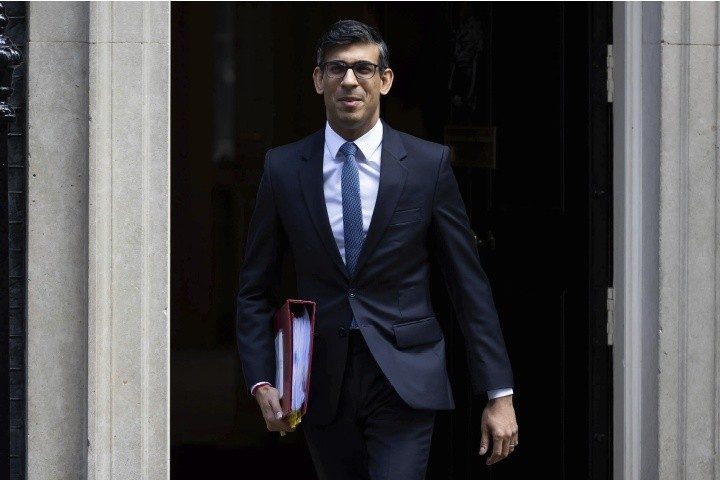
On Friday, March 31, British Prime Minister Rishi Sunak announced that Britain had decided to join an 11-country trans-Pacific trade pact that presently includes countries such as Australia, Brunei, Canada, Chile, Japan, Malaysia, Mexico, New Zealand, Peru, Singapore, and Vietnam.
Following its departure from the European Union (EU), the U.K. hoped to join the Comprehensive and Progressive Agreement for Trans-Pacific Partnership (CPTPP) to enhance its global trade links as well as boost its relations with geographically distant but fast-emerging economies. This move came amid the U.K.’s current foreign policy stance toward China that regards the communist Asian state as an “epoch-defining challenge.”
Moreover, Sunak’s office claimed that the trade deal was the largest since Brexit, with the prime minister lauding the country’s entry into the pact, stating that the deal showcased “the real economic benefits of our post-Brexit freedoms.”
“Joining the CPTPP trade bloc puts the UK at the center of a dynamic and growing group of Pacific economies,” Sunak said.
Furthermore, CPTPP membership would add to existing bilateral free trade agreements (FTAs) the U.K. has with most of the member countries, besides providing businesses with more options over the terms they can trade under.
Britain also claimed that the deal, which will reduce tariffs on cars, spirits and dairy products, would bolster its economy by £1.8 billion annually in the long run — a figure that could increase as more countries become members.
“The Pacific Rim is forecast to grow twice as fast as Europe, so UK businesses should be thinking about their regional presence,” said Sally Jones, trade policy and strategy partner at Ernst & Young.
“The CPTPP makes that much easier, and the CPTPP will only get bigger as more countries look to join.”
With the U.K.’s latest decision, the kingdom has become the first non-founding member of the CPTPP.
“Fantastic news for UK business and consumers as we increase trade with the dynamic Indo-Pacific region, providing the future of global GDP growth,” U.K. Trade Secretary Kemi Badenoch tweeted.
To boot, the U.K’s membership would vindicate the positions of many U.K. politicians who have long asserted that the U.K. was right in leaving the EU. After all, Sunak’s declaration on Friday marked the culmination of 21 months of rigorous diplomatic talks, thus arguably offering his party a major boost.
Also, with Sunak’s government recently inking a major nuclear submarine deal with Australia and the United States pledging the British to a semi-permanent naval presence in the Pacific, CPTPP membership signals another recalibration of Britain’s focus on Asia.
The U.K. claims that the CPTPP would boost its resilience to manufacturing supply chains by ensuring tariff-free movements of components and raw materials used in finished products. Also, U.K. Chief Trade Negotiation Adviser Crawford Falconer, with a past portfolio as a New Zealand senior trade official, indicated previously that “one-half of the 2.3 billion middle class” around the world will be in the Indo-Pacific region by the middle of this century, exactly the customer demographics for Britain’s services-based export economy.
Notably, Japan chaired negotiations on the U.K. joining the pact. The East Asian country’s Economy Minister Shigeyuki Goto remarked that U.K. membership in the pact was of “great significance” in boosting free trade, open and competitive markets, as well as economic networks beyond the Pacific Rim.
Alluding to economies such as China and Taiwan that have applied to join, Goto responded that Japan would need to scrutinize whether they were “fully prepared to meet the high standards” of the trade pact.
The U.K.’s membership in the CPTPP would also enable its voice to be heard in future discussions about China’s potential membership at a time when China’s rising ascendancy and warming ties with Russia showcase the influence Asia has on European security considerations.
Reuters reported that Taiwan’s leading trade negotiator John Deng pledged that Taiwan will “continue efforts to gain support from CPTPP countries” for membership.
In turn, Chinese Foreign Ministry spokesman Mao Ning maintained Beijing’s displeasure at Taiwan joining “any agreement or organization of an official nature,” while adding that China’s membership in the CPTPP would be good.
“China’s accession to CPTPP is not only in line with our own efforts to deepen reform and expand openness, but also conducive to CPTPP member countries’ expansion into China’s market and economic and trade cooperation with China,” she said.
Formed in 2018 after the then-U.S. President Donald Trump’s decision to withdraw from the previous Trans-Pacific Partnership trade over opposition in Congress to the pact because of its threat to U.S. sovereignty, the CPTPP bloc aims to reduce or eradicate barriers to trade in goods. This bloc now accounts for around fifteen percent of global trade and around thirteen percent of world economic output.
Japan’s Chief Cabinet Secretary Hirokazu Matsuno acknowledged that it was “desirable” for the United States to rejoin the trade pact, and Tokyo would continue to persuade Washington to become a member.
Nonetheless, some observers have said that there would be minimal immediate trade benefits for the U.K. after it joins the CPTPP.
Specifically, an official policy paper unveiled in April 2021 when the U.K. government applied for CPTPP membership estimated that the real value to the country’s economy from the CPTPP will be around a negligent 0.08 percent of gross domestic product over the next 15 years.
Furthermore, the U.K. already has bilateral free-trade agreements with all member-states besides Brunei and Malaysia, and the CPTPP is not entirely free trade; it is trade managed by a supranational trade authority, which, as mentioned above, could threaten member nations’ sovereignty.
Pro-EU analysts have lambasted the CPTPP as a poor replacement of the U.K.’s prior EU membership and accused Sunak’s government for trying to distract the public from the allegedly adverse economic impacts the country has experienced since Brexit. Some London critics even claimed that joining the CPTPP would undermine the U.K.’s ability to rejoin the EU later.
Joining in the host of critics have been U.K. trade union members such as Paul Nowak, general secretary of the Trade Union Congress. Nowak alleged that the CPTPP would condone the “exploitation” of workers in places such as Vietnam and Brunei “where independent unions are banned.”
The U.K.’s departure from the EU in 2020 was merely one of the many setbacks to the EU’s credibility as a supranational alliance. Undeniably, the U.K.’s CPTPP membership this year would only add embarrassment to Brussels’ viability.
At the moment, Brussels is red-faced, following allegations of cash-for-influence corruption in the form of Qatargate. For the past months, top EU officials have been found to be compromised by their financial relations with foreign powers.
On March 29, Henrik Hololei, Director General of the Commission’s transport department, quit his post amid proofs shown by news platform Politico that he junketted off to Qatar while negotiating a high-stakes aviation agreement with the Gulf state.
Based on Politico’s assertions, Hololei flew business class for free on Qatar Airways nine times between 2015 and 2021, even during a key period when the EU-Qatar open skies agreements were underway. The Qatar government or a Qatar-linked group reportedly financed four of Hololei’s flights.
Despite landing in hot water over the aforesaid scandal, Hololei would still transition to a new role as a political adviser in the Commission’s internal partnerships wing, focusing on international development.
Bruno Waterfield, Brussels correspondent of The Times, referred to Hololei’s case as an illustration of the “caste identity” among the Brussels elite, which fostered endemic corruption.
The European Ombudsman formally penned a letter in early March this year to the Commission to find out how the Commission planned to revamp its disclosure policies following the Qatargate scandals.
On its end, the Commission decided to tighten its rules, urging staff to restrict travel to only major global events.



